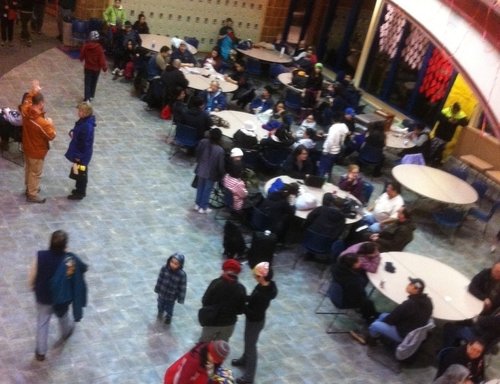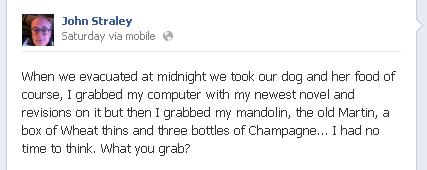
Sitka resident Charles Bingham shot this photo on his iPhone from the balcony at Sitka High School. The school is one of two designated as evacuation shelters during a tsunami warning. Officials estimate about 1,500 people waited out the warning at Sitka High.
In Sitka, the tsunami siren blew at 12:13 a.m. And for residents, in low-lying areas, the siren’s message was clear: Get out of your house and move to higher ground. But many found they weren’t exactly prepared for a sudden relocation.
After the all-clear had sounded, and Sitkans returned home, resident John Straley – an author and the former Alaska Writer Laureate – took his words to Facebook.
 And within minutes, his friends – also awake, also rattled, also fresh home from the evacuation centers or hillside homes of friends – began to comment. Guitars, cameras, guns, ammo, food, pets, important documents, photos. One said she brought her knitting bag, in case it was a long night.
And within minutes, his friends – also awake, also rattled, also fresh home from the evacuation centers or hillside homes of friends – began to comment. Guitars, cameras, guns, ammo, food, pets, important documents, photos. One said she brought her knitting bag, in case it was a long night.
So on Monday morning, we posed Straley’s question to people downtown Sitka – What did you grab in the evacuation?
“I grabbed clothes for my kids, and my daughter’s pink bunny, and both our computers, and left my cell phone charger behind,” said one woman.
Someone nearby chimes in: “So did I, and my phone was almost dead and I couldn’t call anybody.”
Here’s something else we heard Monday: “I actually slept through the earthquake, but when it was time to evacuate, everyone came to my house, so I woke up to half the town being right outside my house. I do not have a kit with me, that would probably be a good idea. But I would probably take a dog. I’m not quite sure. I’m not ready for a tsunami.”
Make no mistake about it: On the macro level, the evacuation of Sitka’s low-lying areas was pretty orderly. People were calm and bided their time with friends or at two school buildings opened as temporary shelters.
But on the individual level, a lot of people said they felt personally unprepared. And maybe that’s good, in a way.
“The people that are more prepared for a disaster are often times the people that have already experienced something where they were unprepared,” said Kelley McGuirk, disaster services director for the Red Cross of Alaska.
She says for many in the state, it’s less about whether they have the supplies, and more about whether they can get at them easily.
“As people that live in Alaska, a lot of us enjoy doing outdoor activities, and have all the gear we recommend people to put in their kit, the problem being that it’s not all in one location,” she said. “It’s kind of scattered around the house, or shed, or garage.”
So the Red Cross, and other disaster prep experts, urge people to put kits together. A kit should include water, non-perishable foods, flashlights, battery powered radios, extra batteries, a first aid kit, phone chargers, personal documents… and there are special items you should consider, based on your family’s needs.
“If there’s somebody in the family that has a specific prescription or medication that they need, make sure you include that in the kit…”
And if you’re evacuating with pets, remember pet food. The University of Alaska Fairbanks Cooperative Extension Service also has a list, and it’s tailored to Alaska.
So, back to John Straley. Remember what he said he grabbed …
- our dog and her food of course
- my computer with my newest novel and revisions on it
- mandolin
- the old Martin (guitar)
- a box of Wheat thins
- three bottles of Champagne
The dog food and the Wheat Thins would probably pass muster with the Red Cross, but Straley laughs at the rest of it.
“I was very impressed with the preparedness of our whole community. I was less impressed with my own preparedness,” he said. “Although the champagne came in handy.”
But in all seriousness, Friday night’s earthquake might have been a bullet dodged, and the evacuation shortly after a lesson learned.
“Somebody said we got all the benefits of an emergency without any of the real sorrow of having it come true. We had to actually take it seriously, and go through it,” Straley said. “It was quite a night. Everybody talking about it didn’t get a lot of sleep that night.”































